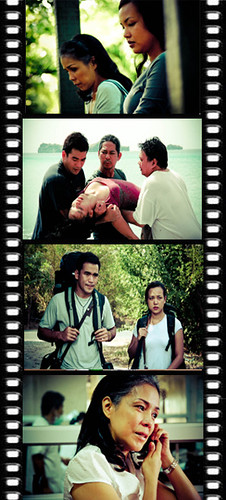
"Mangatyanan" is a complex narrative of a daughter finally finding the courage to forgive her father for the unspeakable sin of incest, and her mother for innocently suspecting that her father has another woman.
The impulse to interpret director Jerrold Tarog’s
Mangatyanan as a film about a daughter finally finding the courage to forgive her father for the unspeakable sin of incest, and her mother for innocently suspecting that her father has another woman, with the misconception fueling her mother’s decision to quit on them at the precise moment that savagery is being committed, is almost immediate. To view the complex narrative of Mangatyanan as a mere family affair gone sour, and eventually resolved, however, would be a misreading of the screenplay by Ramon Ukit.
Mangatyanan stars Che Ramos as Himalaya “Laya" Marquez, a travel photographer visited in her sleep since she was 12 by the ghosts of the frenzied foul friction of the flesh between her and her father, famous photographer Danilo Marquez. Now 27 years old, struggling travel photographer Laya is sent by her editor to Isabela province to document a rare harvest ritual called
“Mangatyanan" performed by the Labwanan tribe. In this photo assignment, Laya is joined by another photographer, Neil Ryan Sese, who blindly venerates her father and elevates him to an almost saint-like stature. What the two shutterbugs find out as they join the Labwanan tribe in the ritual preparations and on the day of the
Mangatyanan itself is a microcosm of the crumbling contemporary Philippine society.
Shaky unity The tribal elders (represented by our parents in this age of an ever-widening digital divide) are pretty much to be blamed for the ethnic mess. The stark questions posed by scriptwriter Ukit and director Tarog are: can we and how do we forgive our parents for bequeathing to us a Philippines in its present pitiful state? Among the Labwanan, those who have the education and the means to flee the village have abandoned the tribe. They never looked back, choosing instead to erase from their collective memories the scars of pains and problems of their ancestral land. The young ones left behind wistfully dream of migrating to Metro Manila, where they see opportunities that would improve their wretched lives. The elders that remain in the Labwanan ancestral domain are corrupted by the powers vested in them by their tenuous social positions. The tribal chieftain (Mang Renato, played by Publio Briones III) governs with an iron fist and severely punishes those who question his authority, including his only son who is groomed to be his successor. One scene shows the son on his way to a bus terminal, signaling his disdain to eventually ascend the office of the tribal chieftain and abandonment of his social role. The rest of the elders keep quiet and endure the tyranny to preserve the shaky societal unity.
 To view the complex narrative as a mere family affair gone sour would be a misreading of the screenplay.
To view the complex narrative as a mere family affair gone sour would be a misreading of the screenplay. 
Laya, in witnessing the true state of the tribal tale which is contrary to the scenes captured by her father during the bygone heyday of the Labwanan folk, is forced to deal with her own life story: her mother’s cowardice in dealing with her father and her mother’s subsequent desertion of the family, leaving her to the mercy of her father’s brutality. Laya herself, after saving enough money, summons the guts to follow the example of her mother (played by Irma Adlawan) in ditching her father as he is consumed by old age and disease. Mother and daughter employ the same strategy in coping with their family trials. Fate forces mother and daughter to cross paths and confront each other when they receive word that Danilo is awaiting death in a hospital. Wife is able to forgive her husband, but daughter does not. Laya’s father, even in his afterlife, continues to visit her in her dreams. This goes on for a long and difficult period until one night, she finally lets go and makes peace with her dead father through a long dialogue. It is only at this point that the viewers get to see the face of famous photographer Danilo Marquez. Withholding the immediate visual representation of the sinful father is perhaps a mechanism used by the director to allow the viewers to shape inside their heads multiple images of abuse and violence as they feel the angst of Laya.
Mangatyanan’s production designer Benjamin Padero won the Best Production award “for effectively creating the physical and oppositional terrains for the urban and rural, and the real and mystical, in a story of a young girl’s coming to terms with her own troubled past." In an interview, Tarog said
Mangatyanan is the second installment of a trilogy. The first is the film Confessional, which won 13 major awards including Best Film at the 10th Osian’s Cinefan (India) and was also nominated in local film competitions. He is currently working on the last film in the trilogy. -
GMANews.TV 
 To view the complex narrative as a mere family affair gone sour would be a misreading of the screenplay.
To view the complex narrative as a mere family affair gone sour would be a misreading of the screenplay. 



